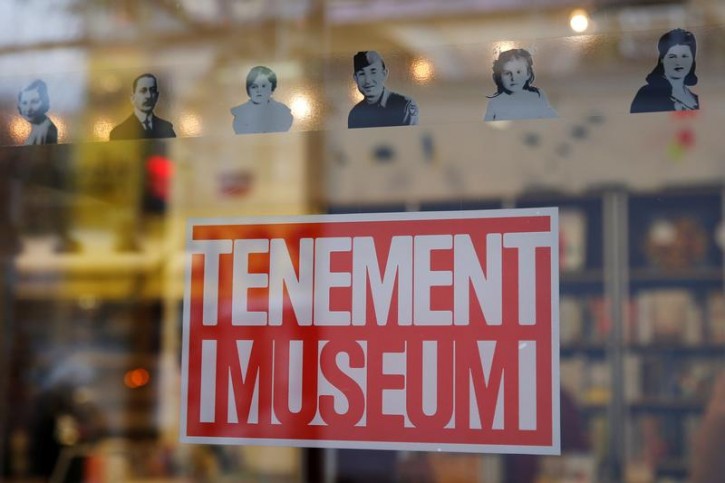
New York – A New York City history museum that celebrates immigration to the United States is giving its guides new training to help them deal with an increase in hostile remarks among visitors about immigrants.
New York’s Tenement Museum has long organized tours for small groups with the stated mission of enhancing the public’s appreciation for the role immigration plays in shaping the United States’ national identity.
But with elections having stirred passions nationwide over the topic of immigration and refugees, museum employees say they are confronted with an unprecedented number of negative comments by visitors about today’s migrants.
The previously infrequent incidents now occur every day, museum officials say.
On Nov. 8, Donald Trump won a surprise victory in the U.S. presidential election after a campaign that featured hardline immigration proposals. Meanwhile, the admission of refugees from war-torn Syria into the country has divided the American public.
“People will now share stronger opinions about whether or not they think immigrants are sort of bleeding (the country), they’re taking too much that other people should have, or they’re taking our jobs,” said Miriam Bader, the museum’s director of education.
“You’ll hear much more blanket comments, or comments like ‘You know, the immigrants of the past aren’t like those of today’.”
Located in New York City’s Lower East Side, the museum tells the stories of generations of destitute Italian, Irish or German families who came in waves to the United States only to face marginalization in their new communities.
Visitors stroll through historical reconstructions of cramped apartments, imagining the lives of their previous tenants such as the Moores, Irish immigrants struggling with prejudice, or the Baldizzis, who emigrated from Italy during the Great Depression.
But where guides used to have to prod visitors toward drawing parallels between past and present, today’s visitors need no encouragement, said Bader.
One tour on early Irish immigrants made outcasts by their host country often spurs comparisons with Muslim and Hispanic newcomers, Bader said.
Another, in which visitors learn about a 1924 law imposing strict restrictions on European immigration – the Johnson Reed Act – will draw remarks about today’s anti-immigration rhetoric, said Jon Pace, the museum’s communications manager.
“We’ve always been a dialogue-oriented museum that invites visitors into the conversation and engages them in co-constructing the story,” said Bader.
But, she added, “The political climate has created a need for new skills or superpowers to facilitate the conversation.”
HEATED DEBATES
Cherrye Davis, a 30-year-old guide, said during election season she has seen more heated debates among visitors comparing immigrants from centuries past with today’s newcomers.
Davis recalled how a tour that features the story of an early 20th century Italian immigrant overstaying her visa thrust the room into the modern national conversation about the country’s current 11 million undocumented immigrants.
“I could see people take a deep breath,” she said about the episode that took place a few weeks before the election.
One visitor, a woman in her 50s, interjected: “It was different back then, immigrants back then were different,” according to Davis. A younger visitor shook her head in disapproval.
Davis’ colleague Victoria Marin, 33, has also had her share of testing experiences while guiding visitors, she said.
“People tend to bring up the refugee crisis quite a bit,” she said.
Earlier this year, while giving a tour on German and Italian immigration, discussion steered toward refugees fleeing Syria and other war-torn countries for the United States.
A Honduran man spoke up, Marin said, likening his own ordeal to that of the Irish of the past. His desperate relocation to the United States from his violent homeland had separated him from his wife, who had remained there, he had said.
Another visitor later remarked: “Look, I feel bad (for today’s refugees) but we have to watch out for our security first,” the visitor said, according to Marin.
NO SHORTAGE OF MATERIAL
With such situations increasingly common, the Tenement Museum’s management put in place a new compulsory training program in September.
Since then, guides have begun meeting informally to address challenging remarks that leave them struggling for a response.
“The needs for them have changed and magnified in this current political climate,” said Bader.
“Even though the same situation won’t necessarily happen again, then you’ll have more tools so as not to be caught as off guard if someone makes a comment about, you know, ‘immigrants are not like the ones of the past’.”
There should be no shortage of material, said Davis.
A new exhibit on more recent waves of migrants from China, Puerto Rico and Jewish Holocaust survivors is set to open in July 2017.
“It’s going to bring the conversation far closer,” said Davis. “Considering the political climate and the recent election, I hope that the conversation can open up in a very empathetic way.”
As reported by Vos Iz Neias
